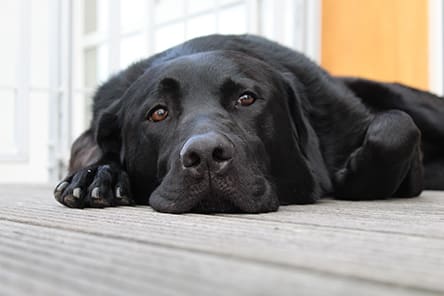Like their people, dogs can develop pneumonia. While pneumonia can be serious in dogs, treatment is available and most dogs recover well. Here's more from our Bartlett vets about the signs and symptoms of pneumonia in dogs, and how this condition is treated.
Pneumonia in Dogs
Pneumonia is a condition that affects the respiratory system, including the lungs and airways and interferes with your dog's ability to breathe normally. With treatment dogs typically recover well from pneumonia, however if the condition is left untreated symptoms may become severe and more serious conditions could develop.
Viral & Bacterial Infectious Pneumonia in Dogs
The most common type of pneumonia in dogs is infectious pneumonia (bacterial pneumonia). This form of pneumonia is caused by a viral or bacterial infection in the dog's respiratory system.
One of the bacteria most commonly linked to infectious pneumonia in dogs is Bordetella bronchiseptica. This bacteria can easily be transmitted between dogs that have compromised immune systems, or dogs that are very young or old.
Symptoms of Bacterial Pneumonia in Dogs
If your dog is suffering from bacterial infectious pneumonia you will likely notice one or more of the following symptoms:- Breathing difficulties
- Coughing
- High fever
- Runny nose
- Difficulty exercising
- Nasal whistling or wheezing
- Irregular breathing
- Dehydration
- Lethargy
- Weight loss or loss of appetite
Symptoms of pneumonia should never be ignored. If you notice that your dog is displaying any of the symptoms listed above, contact your primary care veterinarian to schedule an examination for your pup. Be sure to let your vet know that you think your dog may have bacterial pneumonia when you call.
Aspiration Pneumonia in Dogs
As with people, aspiration pneumonia can occur if your dog accidentally inhales vomit or medication, has an abnormality of the pharynx, or a neuromuscular disorder which affects respiratory function. An enlargement of the lower esophagus due to frequent regurgitation (typically caused by acid reflux) can lead to aspiration pneumonia in some cases, as can an incorrectly placed feeding tube.
Signs & Symptoms of Aspiration Pneumonia in Dogs
Symptoms of aspiration pneumonia are much the same as those listed for bacterial pneumonia and can include:
- Breathing difficulties
- Difficulty exercising
- Coughing
- High fever
- Runny nose
- Nasal whistling or wheezing
- Irregular breathing
- Dehydration
- Lethargy
- Weight loss or loss of appetite
That said, aspiration pneumonia can cause more unusual symptoms such as:
- Difficulty swallowing
- Bluish skin
- Altered mood
- Frequent regurgitation
If your dog shows any of the signs of aspiration pneumonia contact your vet to book an appointment for your pup. Early diagnosis and treatment can help to prevent more severe symptoms and conditions from developing.
Treatment for Pneumonia in Dogs
Common medications prescribed by vets for the treatment of infectious bacterial or aspiration pneumonia in dogs include, non-steroidal anti-inflammatory medications for fever and pain, and bronchodilators and expectorants for coughing and breathing problems. Dogs suffering from a severe case of pneumonia may need to be hospitalized and provided with supplemental oxygen, intravenous antibiotics, or fluid therapy.
What can I do to help my dog recover from pneumonia?
Specific instructions for caring for your dog as they recover from pneumonia will be provided by your vet, and may include:
- Restricting your dog's activities
- Keeping other pets and small children away in order for your dog to rest
- Supplying plenty of fresh water to help keep your pet hydrated
- Providing your dog with a steam treatment by running a hot shower while you sit with your dog in the bathroom
NOTE: Bacterial pneumonia - If your dog has been diagnosed with bacterial pneumonia it's a good idea to keep your unwell pup away from other pets in the household, as well as to wash bedding, bowls, collars and leashes frequently to help avoid spreading the disease. Be sure to also wash your hands immediately after petting or handling a dog with infectious pneumonia.
If you think that your dog may have pneumonia call our Bartlett vets at Hillcrest Animal Hospital. Our vets are here to help your pet feel better.

Looking for a vet in Memphis?
We're always accepting new patients, so contact our veterinary hospital today to book your pet's first appointment.Related Articles View All
Heimlich Maneuver For Dogs: What To Do If My Dog Is Choking
What should you do if something gets lodged in your dog's throat and they begin to choke? Here, you will find helpful information on the Heimlich maneuver for dogs and what to do if your dog is choking.
Signs That Your Dog May Have a Cavity
Can dogs get cavities? What are the signs of cavities in dogs? In today's post, you will find the answers to these dog cavity questions and more.
Chipped Tooth in Dogs - What to Do if Your Dog Has a Broken Tooth
Dogs often experience chipped or fractured teeth. Is a broken dog tooth an emergency? It might be. Today's post contains information about broken teeth in dogs and what to do about dog tooth fractures.
Large Dog Care & Saving Money with Wellness Plans
What do large and giant breed dogs need to stay healthy and happy? Here, we provide vital information on how to proactively care for your giant or large dog's health and save money along the way.
